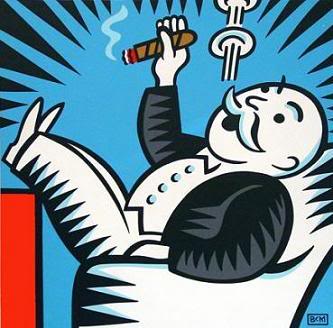Sunday, November 10, 2013
Hey Educational Plutocrats -- we're on to you!
As urban public school teachers, we aren't the cleverest when it comes to the business world. If we were business-savvy, we wouldn't be driving 10-year old cars, clipping coupons, shopping at Kohl's and coloring our own hair. But we do like to read, and we've been reading about rich people. We've learned a lot!
So it seems that there is, and always has been, a class of people called plutocrats who dominate society through their great wealth. Filthy rich Roman plutocrats smashed their dishes after dinner parties to celebrate. When we think of American 20th century plutocrats, we think of Uncle Pennybags from Monopoly: top hat, monocle, mustachio. We think of Rockefeller and Carnegie. Back in the day, the benefit of being filthy rich was that you got to be filthy rich! Sure, you might found a university or an orphanage, but you also got to enjoy -- conspicuously -- your homes, your boats, your furs, your jewels and your bespoke clothing.
But then things changed during the 1960s. A lot of people started having new ideas about things like treating minorities and women fairly, preserving the environment, and butting out of foreign wars. This was the beginning of the idea that it's uncool to be filthy rich.
Uncle Pennybags resurfaced during the Reagan/Thatcher years, when Wall Street brokering and the Preppy Handbook were briefly fashionable, and yet the election of our first self-professed black president, Bill Clinton, marked the transition back into some 1960s thinking.
The bohemian bourgeois of the 1990s (the rich people for whom a $40,000 speedboat is unspeakably vulgar but a $40,000 zen bathroom is an absolute must-have) have evolved and increased their wealth. Some of them were thought to represent the 1% against whose power the other 99% ineffectively demonstrated in the Occupy movement. The Occupy folks got it wrong -- they were demonstrating against only MINOR plutocrats, not the big hogs. And these big hogs wear very different clothes than Uncle Pennybags.
These NEW filthy rich folks, like Bill Gates and Eli Broad, wear a cloak that makes them irreproachable. This cloak is very different from the top hats, furs and bespoke clothing of historical filthy rich people. THIS cloak is constructed from bohemian bourgeois attitudes gleaned from the 90s woven into a very au courant and savvy philanthro-capitalism: the organizations and federal-policy-shaping endeavors which purport to tran$form, amongst other things, urban schools. This cloak is a win-win garment: it permits trickle-down profit to educational profiteers everywhere, while maintaining the wearer's status as hog-with-the-big-nuts who has a social conscience, PLUS, admiration from a lot of the 99%. If these guys were medieval royalty, they would DEFINITELY have purchased a choice spot in Heaven -- maybe not seated at the right hand of the Father, but close. We can't blame them completely for wearing this cloak, though, because it's the required uniform for contemporary American plutocrats. Kind of like top hats 100 years ago.
We would really admire Bill Gates and his ilk if they made one of two choices:
1. To donate most of their wealth, Peter Singer-style, to actually solving American poverty. Eli Broad, seeder of American urban districts with Broad Institute $uperintendants, has a net worth of 6.3 BILLION dollars. If he gave away 90% of his dough, he would STILL have 630 MILLION dollars. A few ways to actually chip away at poverty might involve providing a complete remodel to inner-city areas of devastation, establishing a nation-wide system of full-day child enrichment and health programs for poor children from birth to five, and supporting humane and dignified ways to give people reason and opportunity to regulate their own fertility until they are in the position to adequately raise children.
OR
2. To enjoy their wealth in Uncle Pennybags-style, as is the wont of plutocrats.
Subscribe to:
Post Comments (Atom)

This is a ridiculous simplification of contemporary economic wealth distribution, and shows ignorant disregard for philanthropy. Go take an Econ 101 class, teachers.
ReplyDelete